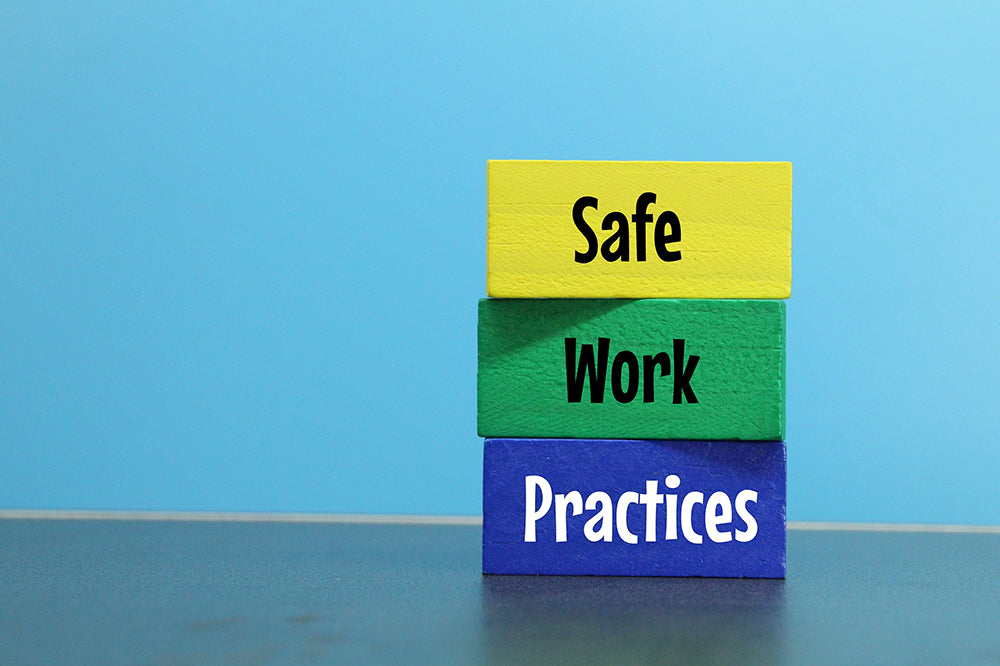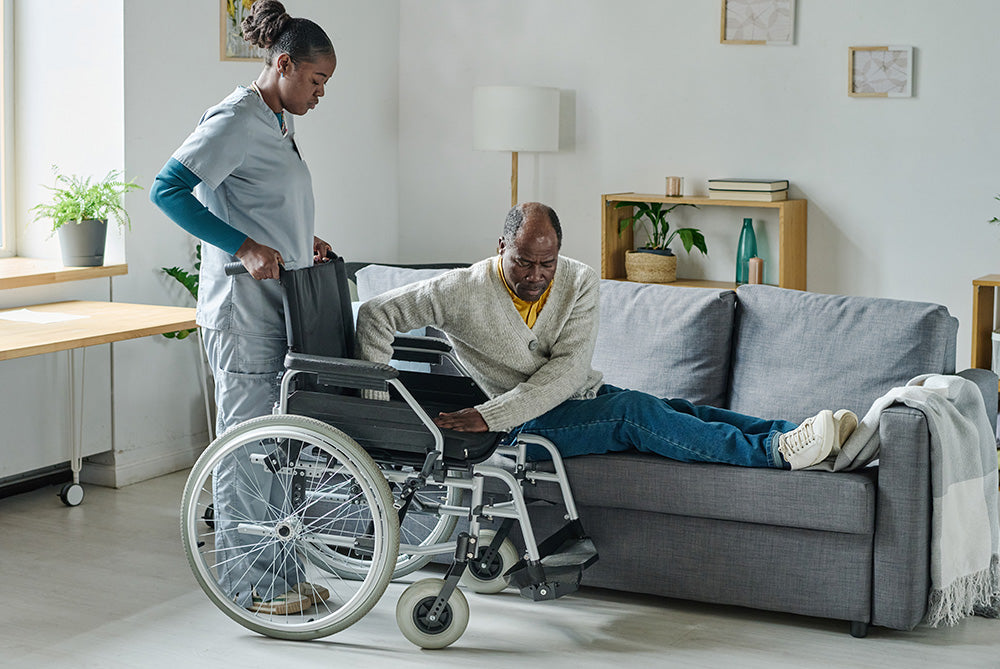You have no items in your shopping basket.
The importance of moving and handling courses for care providers in England
Ensuring safety in assisting and moving: Empowering adult social care providers in England
Rose Mabiza
16-02-2024
Dedicated adult social care providers make a difference in the lives of individuals every day. We recognise your essential role in providing quality care and ensuring the safety of those under your support. As part of the Skills for Care core and mandatory training framework, mastering assisting and moving people is paramount to your professional development. This vital skill aligns with the Care Quality Commission's key question of safety and its significance in delivering high-quality care.
As a Skills for Care endorsed provider, join us as we explore the principles of assisting and moving people and the importance of safe practices.
The importance of safe practices
One of the primary learning outcomes within the Skills for Care mandatory training framework is to move and position an individual safely. It's vital to know the proper techniques and procedures that minimise the risk of injuries to you and the individuals you assist. Understanding the equipment required for safe moving and positioning will also be emphasised to ensure optimal care delivery.
By implementing safe practices, you can mitigate risks and ensure the well-being of all involved, aligning with the Care Quality Commission's fundamental safety standard.

Image by fauziEv8 via Envato Elements

Image by fotodestock via Envato Elements
Guided by best practices
A comprehensive understanding of all legislation, national guidelines, policies, procedures, and protocols for moving and positioning individuals is essential. For example, adhering to the Health and Safety at Work etc Act 1974 (HSWA) will equip you with the knowledge and skills to provide safe and effective care that meets the highest standards set by Skills for Care and the Care Quality Commission (CQC).
Additionally, understanding the anatomy and physiology of moving and positioning individuals will enable you to perform tasks safely and efficiently.
Communication, consent, and respect
Effective communication and obtaining informed consent are crucial components of safe care practices. Respecting individual choices, promoting dignity, and maintaining independence while assisting and moving people are critical within health and social care.
By prioritising these aspects, you can create a caring environment that upholds the highest standards of compassion and person-centred care.

Image by vladans via Envato Elements

Image by 89STOCKER via Envato Elements
Understanding anatomy and physiology
When providing safe care, it is crucial to understand how the human body functions and responds to movement. You can safely and effectively perform tasks by understanding how the human body functions and responds to movement.
In our Moving and Handling people for homecare course, we provide practical techniques to help you apply this knowledge in your everyday practice. This knowledge will enable you to use appropriate methods and minimise the risk of injuries.
Minimising risks and collaborating for safety
Minimising risks before moving and positioning individuals is a crucial competency for adult social care providers. You must be able to identify strategies for minimising risks, implement preventive measures, and seek assistance when needed.
There is an emphasis on the importance of teamwork and collaboration and the role of risk assessment in maintaining a safe care environment. By working together and sharing knowledge, we can create a culture of safety and ensure the well-being of everyone involved.

Image by AtlasComposer via Envato Elements

Image by AnnaStills via Envato Elements
Conclusion
As adult social care providers, your dedication to providing safe and person-centred care is paramount. You can deliver care confidently and securely by engaging in continuous professional development and gaining the necessary knowledge and skills.
From mastering safe practices and complying with legislation to fostering effective communication and understanding anatomy and physiology, it will equip you with the tools to meet the high standards outlined by Skills for Care and the safety aspect of the CQC's fundamental standard. Let us prioritise safety, promote a culture of excellence, and positively impact the lives of those we serve.
Dedicated adult social care providers make a difference in the lives of individuals every day. We recognise your essential role in providing quality care and ensuring the safety of those under your support. As part of the Skills for Care core and mandatory training framework, mastering assisting and moving people is paramount to your professional development. This vital skill aligns with the Care Quality Commission's key question of safety and its significance in delivering high-quality care.
As a Skills for Care endorsed provider, join us as we explore the principles of assisting and moving people and the importance of safe practices.
The importance of safe practices

Image by fauziEv8 via Envato Elements
One of the primary learning outcomes within the Skills for Care mandatory training framework is to move and position an individual safely. It's vital to know the proper techniques and procedures that minimise the risk of injuries to you and the individuals you assist. Understanding the equipment required for safe moving and positioning will also be emphasised to ensure optimal care delivery.
By implementing safe practices, you can mitigate risks and ensure the well-being of all involved, aligning with the Care Quality Commission's fundamental safety standard.
Guided by best practices

Image by fotodestock via Envato Elements
A comprehensive understanding of all legislation, national guidelines, policies, procedures, and protocols for moving and positioning individuals is essential. For example, adhering to the Health and Safety at Work etc Act 1974 (HSWA) will equip you with the knowledge and skills to provide safe and effective care that meets the highest standards set by Skills for Care and the Care Quality Commission (CQC).
Additionally, understanding the anatomy and physiology of moving and positioning individuals will enable you to perform tasks safely and efficiently.
Communication, consent, and respect

Image by vladans via Envato Elements
Effective communication and obtaining informed consent are crucial components of safe care practices. Respecting individual choices, promoting dignity, and maintaining independence while assisting and moving people are critical within health and social care.
By prioritising these aspects, you can create a caring environment that upholds the highest standards of compassion and person-centred care.
Understanding anatomy and physiology

Image by 89STOCKER via Envato Elements
When providing safe care, it is crucial to understand how the human body functions and responds to movement. You can safely and effectively perform tasks by understanding how the human body functions and responds to movement.
In our Moving and Handling people for homecare course, we provide practical techniques to help you apply this knowledge in your everyday practice. This knowledge will enable you to use appropriate methods and minimise the risk of injuries.
Minimising risks and collaborating for safety

Image by AtlasComposer via Envato Elements
Minimising risks before moving and positioning individuals is a crucial competency for adult social care providers. You must be able to identify strategies for minimising risks, implement preventive measures, and seek assistance when needed.
There is an emphasis on the importance of teamwork and collaboration and the role of risk assessment in maintaining a safe care environment. By working together and sharing knowledge, we can create a culture of safety and ensure the well-being of everyone involved.
Conclusion

Image by AnnaStills via Envato Elements
As adult social care providers, your dedication to providing safe and person-centred care is paramount. You can deliver care confidently and securely by engaging in continuous professional development and gaining the necessary knowledge and skills.
From mastering safe practices and complying with legislation to fostering effective communication and understanding anatomy and physiology, it will equip you with the tools to meet the high standards outlined by Skills for Care and the safety aspect of the CQC's fundamental standard. Let us prioritise safety, promote a culture of excellence, and positively impact the lives of those we serve.
About the Mandatory Training Group
The Mandatory Training Group is one of the leading UK providers of CPDUK-accredited statutory and mandatory training, continuing professional development (CPD) courses, eLearning software and workforce development solutions for all sectors.
By making things simple and designing interactive e-learning content, we can provide meaningful training programs at all levels and enhance the capacity and resilience of individuals and organisations.
Click here to see our wide range of accredited health and social care eLearning courses and training.

About the Mandatory Training Group

The Mandatory Training Group is one of the leading UK providers of CPDUK-accredited statutory and mandatory training, continuing professional development (CPD) courses, eLearning software and workforce development solutions for all sectors.
By making things simple and designing interactive e-learning content, we can provide meaningful training programs at all levels and enhance the capacity and resilience of individuals and organisations.
Click here to see our wide range of accredited health and social care eLearning courses and training.
Contact us
Complete the form below to start your ComplyPlus trial and transform your regulatory compliance solutions.



